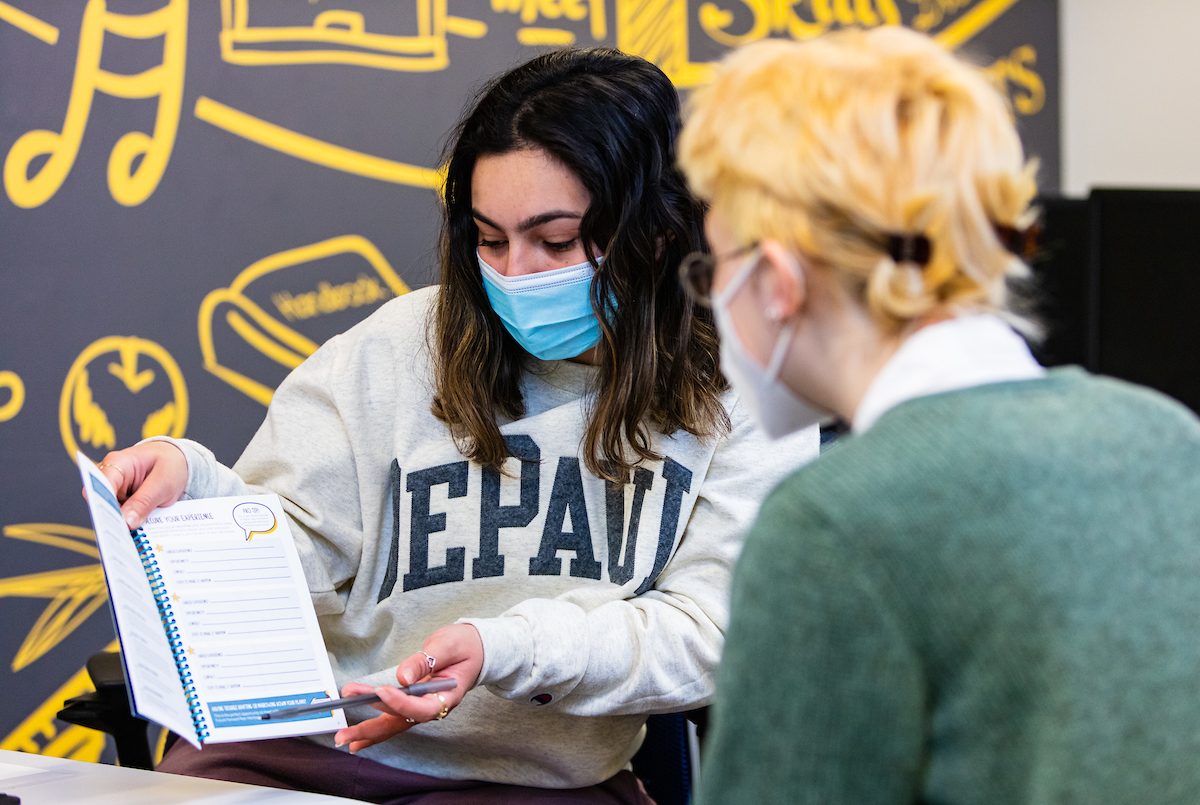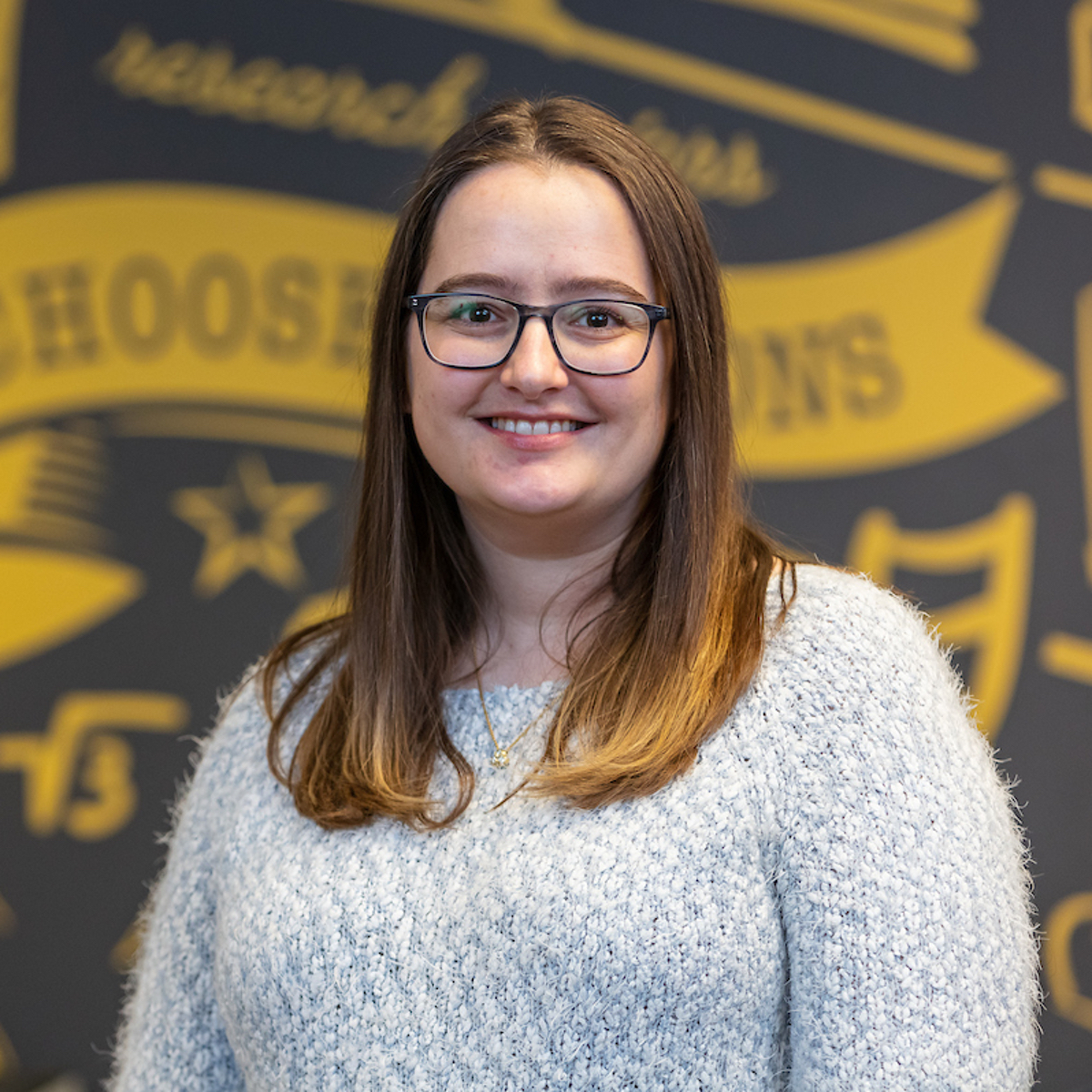 Malak Abuhashish is a student mentor in DePaul’s innovative Future Forward program, which helps incoming first-year students identify and pursue career readiness. (DePaul University/Randall Spriggs)
Malak Abuhashish is a student mentor in DePaul’s innovative Future Forward program, which helps incoming first-year students identify and pursue career readiness. (DePaul University/Randall Spriggs)
For high school seniors, the decision to attend college can feel more settled than the reasons
why to go to college.
Up to half of incoming freshmen will begin higher education not knowing the field they'll study, surveys have found. Without a clear sense of purpose, it can be easier to give up: Most students who quit college do so during their first year.
Helping freshmen find their "why," then, goes hand-in-hand with keeping them in school to complete their degrees. This understanding has inspired DePaul's Career Center to design a new initiative,
Future Forward, that is already connecting with students.
Program director Hilarie Longnecker describes Future Forward as "a year-long career incubator" that helps new Blue Demons discover not only the DePaul Difference — what makes the university unique in higher education — but also what they want out of their college experience.
 Hilarie Longnecker directs Future Forward, a year-long career incubator that helps new Blue Demons discover what they want out of their college experience. (DePaul University/Randall Spriggs)
Hilarie Longnecker directs Future Forward, a year-long career incubator that helps new Blue Demons discover what they want out of their college experience. (DePaul University/Randall Spriggs)
Understanding the intersection between one's major and one's career at the outset of college, she adds, can jump-start career development and ultimately pay off in more satisfying outcomes.
"Figuring out how you're going to make your change in the world is a privilege of higher education. That's where Future Forward starts," says Longnecker, an associate director of early engagement at the Career Center.
Much of Future Forward is self-directed: On their own schedule, students engage with online learning modules that present concepts such as design thinking and the growth mind-set. They then tackle prompting questions that put theory into action.
"Some of the modules look at values, they look at interests — a lot of standard career development," Longnecker says. "But students also are prompted to dabble a bit — to do an informational interview or do a job shadow to learn how to learn about the world of work."
Future Forward regularly gathers groups of students with a mentor to discuss the material and work through any bumps encountered. While mentors help keep participants on track, Longnecker adds, peers also help one another through an online chat feature called Future Feed — building trust and community and forming bonds throughout the university.
Future Forward took shape in the spring of 2020 as a partnership between the Career Center and DePaul Admissions, which was looking to nudge high school seniors who were seriously considering the university into making the deposit necessary to hold their spots.
Once the COVID-19 pandemic shut down campus, Future Forward's online nature made the program even more attractive. It was green-lighted in the spring of 2020, finalized over the summer, and launched to a cohort of 350 students in the fall.
Among the first class were Alexia Suarez and Zoe Espinosa. Both say that they signed up, in large part, because of the tuition grant that Future Forward provides for those who complete the program ($800 a quarter in 2020-21;
$1,000 a quarter this year).
What kept them engaged, though, was the opportunity to learn and grow.
"I was slightly apprehensive before I started. Adding extra work onto my plate wasn't something I was excited for," Espinosa says. "But the information I learned was invaluable. In fact, I never would have realized all the information I was missing; I wouldn't have known where to look."
Espinosa says that connecting to other Future Forward freshmen was especially valuable during a year of online learning. "Future Feed was so great to create a community, especially while I was missing the typical first-year experience," she adds.
Suarez and Espinosa finished the program with a better understanding of their career goals and how their DePaul education helps achieve them. The Career Center saw several successes from the pilot year, too:
- 93% of Future Forward "graduates" returned to DePaul this fall to enroll in at least one class, compared with a 82% retention rate among all 2020-2021 freshmen.
- 87% of participants say they plan to complete an internship; currently, 60% of DePaul students traditionally do this before graduation.
- 88% of participants used the Career Center in their freshman year; in 2019-2020, the year before Future Forward began, just 16% of first-year students did so.
Espinosa and Suarez, now sophomores, returned to the program this year as mentors for the second group of Future Forward freshmen.
"I knew that I wanted to help other students like myself and thought that Future Forward was the best place to do so," Suarez says. "Being a first-generation college student from an immigrant family is by no means easy, but I'm thankful for everything I have done and learned. I hope to share my mistakes and findings with other students so they can learn from the things that I did."
Interest in Future Forward has soared: Every information session about the program for prospective DePaul students and their families reached its limit for sign-ups last spring, Longnecker says. That allowed the program to expand from 350 freshmen to 500.
"Our dream is to offer it to all first-year students," Longnecker says, a step that will require many more mentors.
Scott Butterworth is an editor of Newsline.